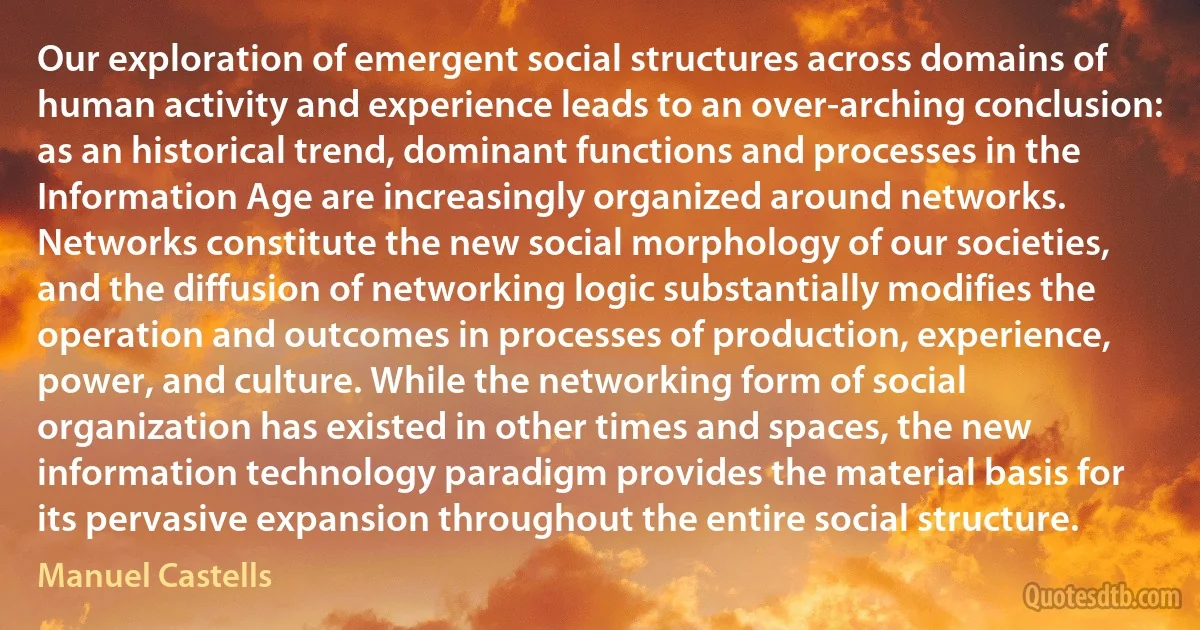
Our exploration of emergent social structures across domains of human activity and experience leads to an over-arching conclusion: as an historical trend, dominant functions and processes in the Information Age are increasingly organized around networks. Networks constitute the new social morphology of our societies, and the diffusion of networking logic substantially modifies the operation and outcomes in processes of production, experience, power, and culture. While the networking form of social organization has existed in other times and spaces, the new information technology paradigm provides the material basis for its pervasive expansion throughout the entire social structure.
Manuel CastellsRelated topics
across age diffusion dominant emergent entire expansion experience exploration form historical human morphology operation organization paradigm power production technology times trend while networkingRelated quotes
The methods of logical procedure are very different in ancient and modem logic, but behind all difference is the construction of a universally valid order of thought, neutral with respect to material content. Long before technological man and technological nature emerged as the objects of rational control and calculation, the mind was made susceptible to abstract generalization. Terms which could be organized into a coherent logical system, free from contradiction or with manageable contradiction, were separated from those which could not. Distinction was made between the universal, calculable, "objective” and the particular, incalculable, subjective dimension of thought.

Herbert Marcuse
It is also the becoming-space of the spoken chain - which has been called temporal or linear; a becoming-space which makes possible both writing and every correspondence between speech and writing, every passage from one to the other.
The activity or productivity connoted by the a of différance refers to the generative movement in the play of differences. The latter are neither fallen from the sky nor inscribed once and for all in a closed system, a static structure that a synchronic and taxonomic operation could exhaust. Differences are the effects of transformations, and from this vantage the theme of différance is incompatible with the static, synchronic, taxonomic, ahistoric motifs in the concept of structure.

Jacques Derrida
It is not infrequently our custom to seek to cover our own blank ignorance of certain subjects with the confident assertion that nothing ever has been or can be really known... and our treatment of this question of the life after death is one of the worst examples of this habit. If popular theology had not most unhappily altogether lost sight of the cardinal doctrine of reincarnation, its· views on this subject of death would naturally be entirely different. A man who realizes that he has died many times before regards the operation more philosophically than one who believes it to be an absolutely new experience fraught with all kinds of vague· and awful possibilities.

Charles Webster Leadbeater
For sure, even with the best will, the modern person seems generally unable to imagine how large a significance those components of our consciousness rooted in religious beliefs have actually had upon culture, national character, and the organization of life. Nevertheless, it can not be, of course, the intention here to set a one-sided spiritualistic analysis of the causes of culture and history in place of an equally one-sided "materialistic” analysis. Both are equally possible. Historical truth, however, is served equally little if either of these analyses claims to be the conclusion of an investigation rather than its preparatory stage.

Max Weber
It always demands a far greater degree of courage for an individual to oppose an organized movement than to let himself be carried along with the stream - individual courage, that is, a variety of courage that is dying out in these times of progressive organization and mechanization. During the war practically the only courage I ran across was mass courage, the courage that comes of being one of a herd, and anyone who examines this phenomenon more closely will find it to be compounded of some very strange elements: a great deal of vanity, a great deal of fear - yes, fear of staying behind, fear of being sneered at fear of independent action, and fear, above all, of taking up a stand against the mass enthusiasm of one's fellows.

Stefan Zweig
